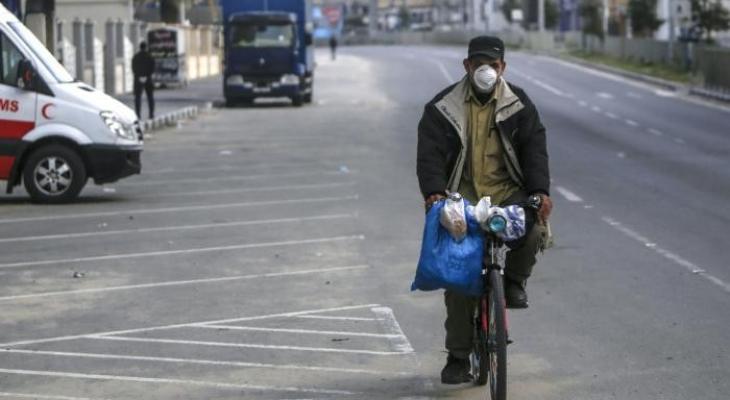Ref: 81/2020
Date: 27 August 2020
Time: 10:00 GMT
The Palestinian Centre for Human Rights (PCHR) warns of the collapse of humanitarian conditions in the Gaza Strip due to the closure imposed by the Israeli authorities on the Gaza Strip for 14 years along with the serious challenges following the outbreak of coronavirus across the Gaza Strip, where 25 coronavirus cases were confirmed and 2 deaths were reported during the past two days outside the quarantine centers.
PCHR further warns of the catastrophic consequences resulting from the ongoing restrictions on entry of hundreds of basic needs into the Gaza Strip, practically medicines, medical supplies and equipment, construction materials and the fuel required to operate the Gaza Power Plant. PCHR emphasizes that the ongoing Israeli closure and its inhuman and illegal collective punishment policy would lead to a serious and accelerated deterioration in provision of basic services for at least 2 million Palestinians who live in poor living conditions in the Gaza Strip, which is classified as the most overpopulated area in the whole world.
With these serious developments and ongoing closure, the Gaza Strip witnesses a new and unprecedented phase that will affect all aspects of life and aggravate the already critical humanitarian conditions. All of this will also :
- Intensify the humanitarian crises and living conditions by increasing the unemployment rate, the prevalence of poverty and food insecurity. The Gaza Strip unemployment rate is dangerously high at 46%, i.e. 211,300 unemployed; this rate is highest among youth at 63%. Also, more than half of the Gaza Strip population suffers poverty, as data from the Palestinian Central Bureau of Statistics (PCBS) indicate that the prevalence of poverty among the Gaza Strip population exceeds 53%, and more than 62.2% of the Gaza population is classified as food insecure according to the United Nations Office for the Coordination of Humanitarian Affairs (OCHA).
- Provision of basic services for the Gaza Strip population was suspended as the Gaza Strip endures a 20-hour power outage per day. Furthermore, drinking water supply is interrupted for long periods, and the power shortage will result in untreated sewage water being pumped into sea in the coming days.
- Cause heavy losses to the Gaza economy due to the suspension of work in industrial, commercial and agricultural facilities that rely on electric power for their production. As a result, these facilities are under the threat of shutdown or going out of business. Also, throughout the past 14 years, these facilities have suffered from severe restrictions imposed by the Israeli authorities on the entry of goods classified as “dual-use items”. The Israeli authorities officially list 62 items as “dual use items” which contain hundreds of goods and basic materials. The items on the “dual-use goods” list are essential to the life of the population, so imposing restrictions on them contribute to the deterioration of infrastructure and the deterioration of economic, health and education conditions. Israeli authorities also continue to ban the export of Gaza Strip products, excluding limited quantities( mostly agricultural products) that do not surpass 5% of Gaza’s monthly exports before the closure in June 2007.
- Inflict further deterioration to health facilities because of the electricity crisis resulting from the power plant shutdown after the Israeli occupation authorities banned the entry of fuel necessary for its operation. Moreover, the Ministry of Health (MOH) in Gaza suffered a shortage in testing kits for coronavirus before the new cases were discovered. MOH urgently needs more intensive care units, respirators, ventilators, and coronavirus diagnostic equipment, medicines, medical consumables and protective gear to prepare it to combat coronavirus. Additionally, hospitals and medical centers currently suffer a serious shortage of 45% of the essential drugs list, 31% of medical consumables, and 65% of laboratory products and blood banking supplies[1].
Ignacio Casares Garcia[2], Head of the International Committee of the Red Cross (ICRC) in Gaza, stated in a press release that, “People are stressed: not only are they coping with just four hours of electricity a day; their worries over the virus have been hugely compounded and they are now under lockdown.” “The Gaza healthcare system would not be able to deal with more than a few dozen coronavirus patients,” said Mr. Casares Garcia. “The treatment of COVID-19 patients requires medical and laboratory equipment and special supplies and medications that are not available in hospitals and health centers in sufficient quantities.” He continued, “They can’t do this alone. They need all the international assistance they can get to make sure they are equipped to deal with the crisis.”
In light of above, PCHR calls upon the international community to:
- Force Israeli authorities to abandon its collective punishment policy on the population of the Gaza Strip, and end the Israeli unjust closure;
- Intervene urgently to ensure the import of all the Gaza Strip’s basic needs to avoid a humanitarian disaster and serious deterioration in all aspects of life;
- Remind Israel of its obligations as an occupying power of the Gaza Strip to its population, in accordance with Article 55 of the Geneva Convention of 1949, which stipulates that “The occupying Power shall, to the fullest extent of its means, provide the population with food and supplies and must take into account the needs of the civilian population.”
[1] For more information, see PCHR’s press release issued on 08/25/2020: “PCHR Warns of Health Sector Collapse and Suspension of Health Services in the Gaza Strip,” available at: https://www.pchrgaza.org/en/?p=14968
[2] To read Mr. Ignacio Casares Garcia press release in full (released on 26 August 2020), please visit the following link https://www.icrc.org/en/document/icrc-gazans-face-double-crisis-need-international-support
